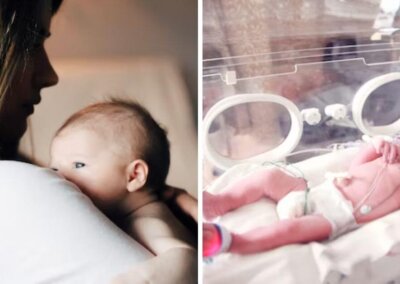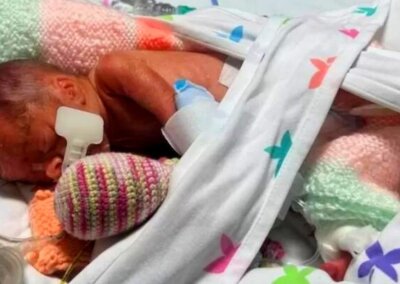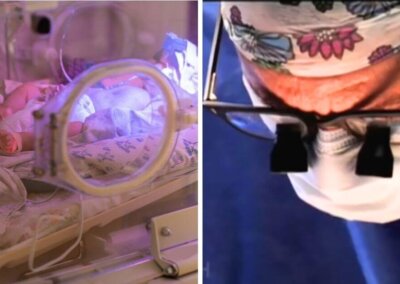Twins born at just 22 weeks gestation and given only a 10% chance of survival were able to return home, and almost a year later, are flourishing.
Babies Kimyah and DJ were born so early that they had to spend almost five months in hospital before they were healthy enough to go home.
For their mother, Kimberly Thomas, everything seemed to be going well during her pregnancy until, unexpectedly, she started leaking amniotic fluid. The 25-year-old mother from Bedford, Ohio, called her doctor as soon as she could and they quickly discovered she was already going into labour.
At only five months pregnant, she was told her babies would only have a 10% chance of survival. After she gave birth, the twins had to be resuscitated immediately. Nurses reported that each was so small that they could fit into the palm of each hand.
Nurse Sara Perrin said they “were the smallest babies I had ever seen, much less taken care of”.
After 138 days in intensive care, they went home
The babies were so fragile that their parents were not allowed to hold their babies for the first month of their lives. But Kimberly didn’t leave their sides.
“I don’t think there was one day I didn’t spend at least a few minutes with them, just to talk to my babies”, she said. “I pretty much lived in the NICU for four-and-a-half months”.
While in the NICU, Kimyah had a small bleed on her brain and one of DJ’s lungs collapsed.
The little fighters never gave up though and were released from the Cleveland Clinic in Ohio after 138 days in intensive care.
The staff held a ‘graduation’ for the twins to celebrate the special moment. The 11-month-old twins were given caps and gowns to mark the occasion.
“It was hard to imagine us ever getting to this point”
Their mother said “I was super excited when I found out they were able to come home” and nurse Becky Stuart said it was “a huge celebration”.
“During their time in the NICU, I treated them as if they were my own children. I love them and formed a bond with them that will stick with me forever”.
Now they’re home, with their parents, their mum said “Kimyah and DJ are very active and love exploring … Thinking about everything they’ve been through, it was hard to imagine us ever getting to this point”.
“It was unclear if they would be able to do anything by themselves. Now, they’re trying to do everything by themselves”.
“You have to stay positive and focus on the outcome you want”.
Outcomes for extremely premature babies are constantly improving.
A 2022 study, ‘Mortality, In-Hospital Morbidity, Care Practices, and 2-Year Outcomes for Extremely Preterm Infants in the US, 2013-2018’, by Dr Edward F Bell of the University of Iowa, found that from 2013 to 2018, with infants born between 22 and 28 weeks gestation, “survival to discharge occurred in 78.3% and was significantly improved compared with a historical rate of 76.0% among infants born in 2008-2012”.
The study, which took place between 2013 and 2018, assessed 10,877 infants born between 22 and 28 weeks gestation in 19 academic medical centres across the US.
This means that almost four out of five extremely prematurely born babies survived and were able to be assessed at 22-26 months corrected age (22-26 months from their due date) for a number of health and functional outcomes.
Right To Life UK spokesperson, Catherine Robinson, said “Stories of such premature babies surviving and flourishing are amazing. They are becoming more and more common and shedding light on our inhumane abortion law, which permits abortion under most circumstances up to 24 weeks in the UK”.












